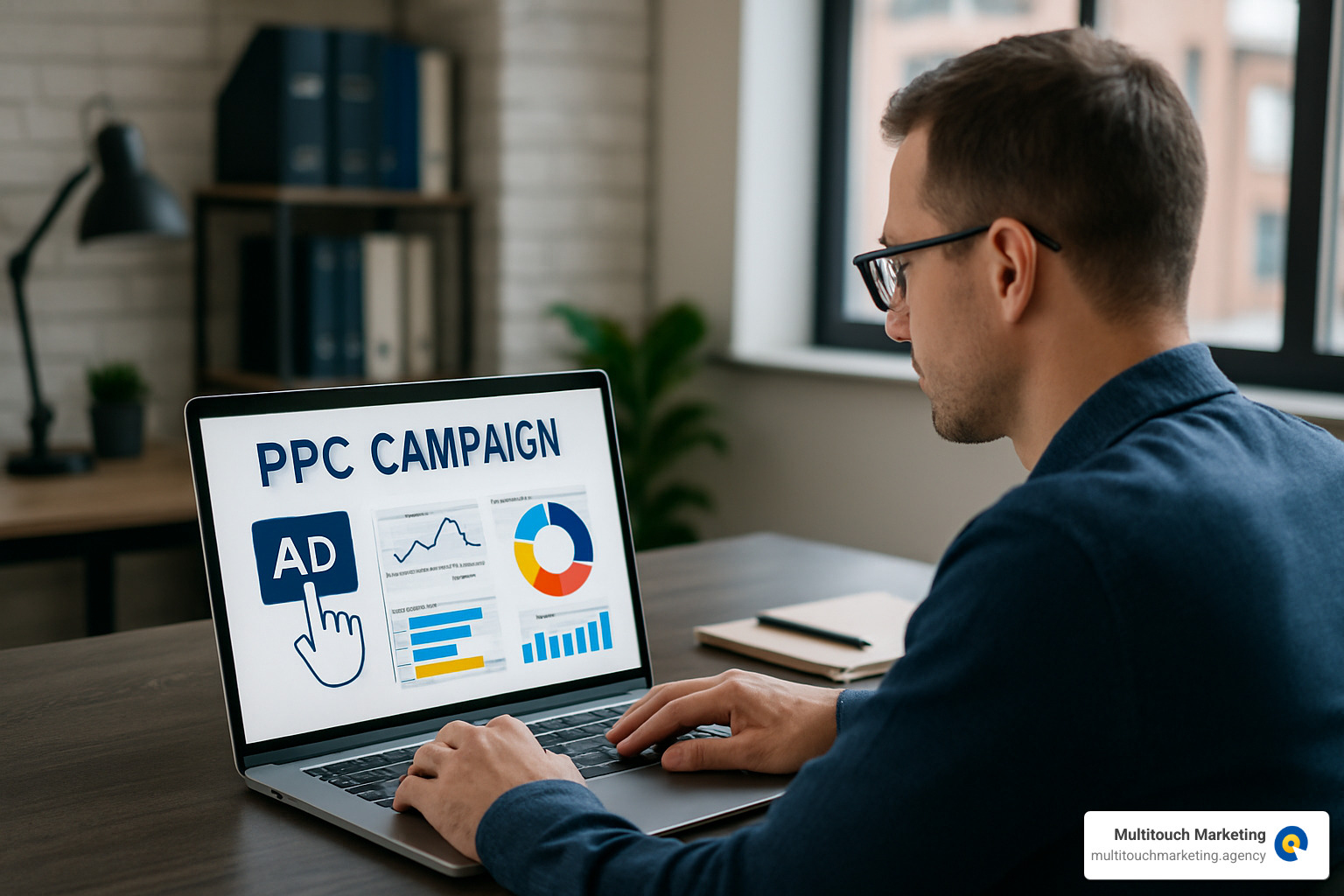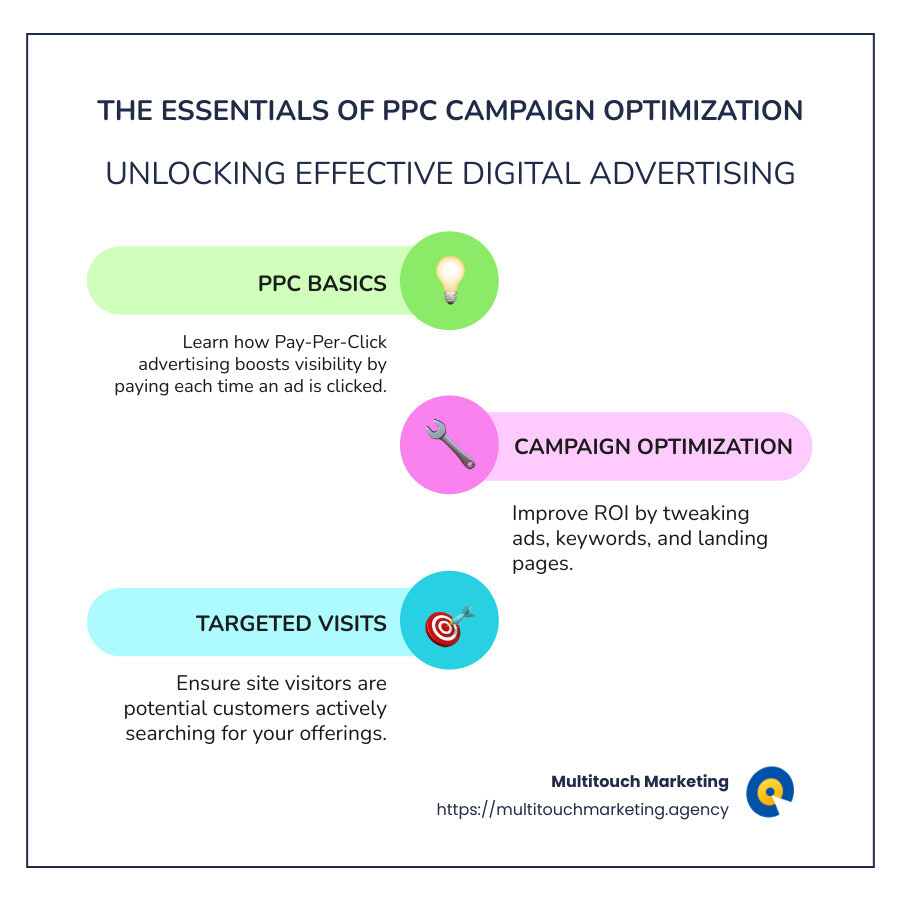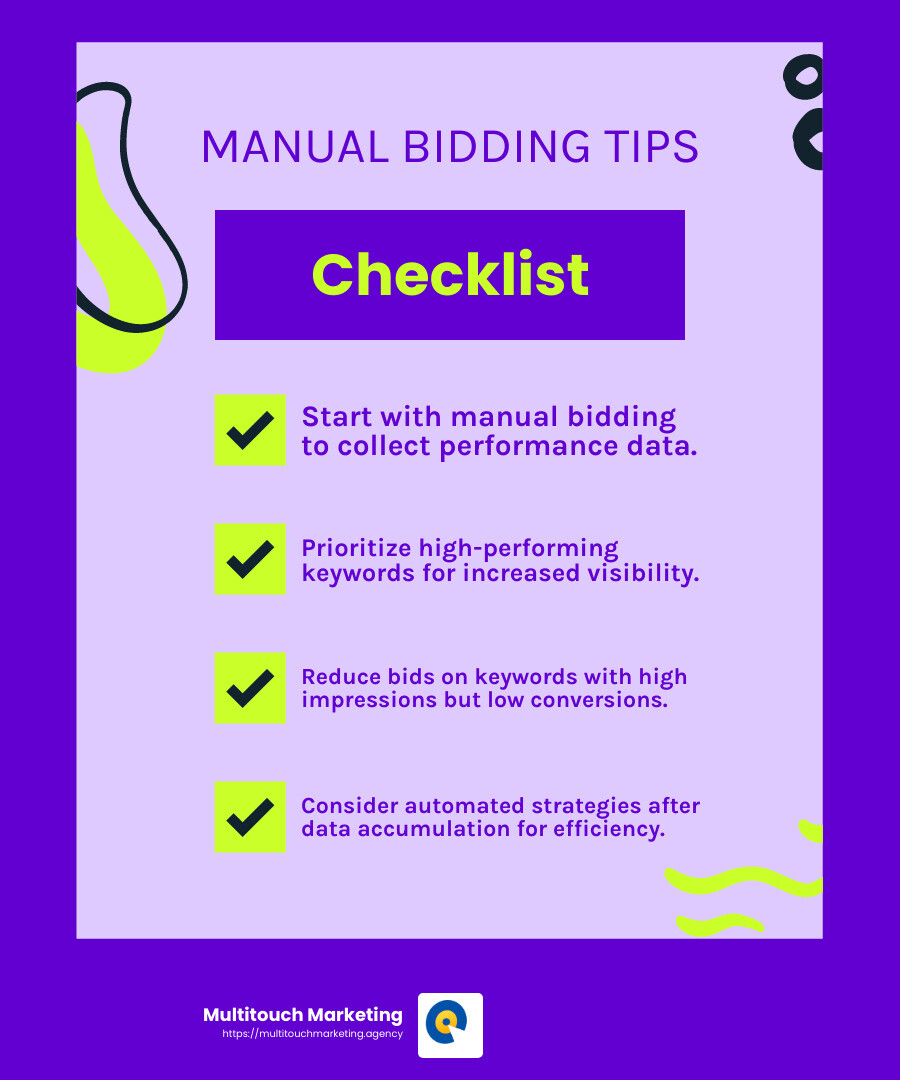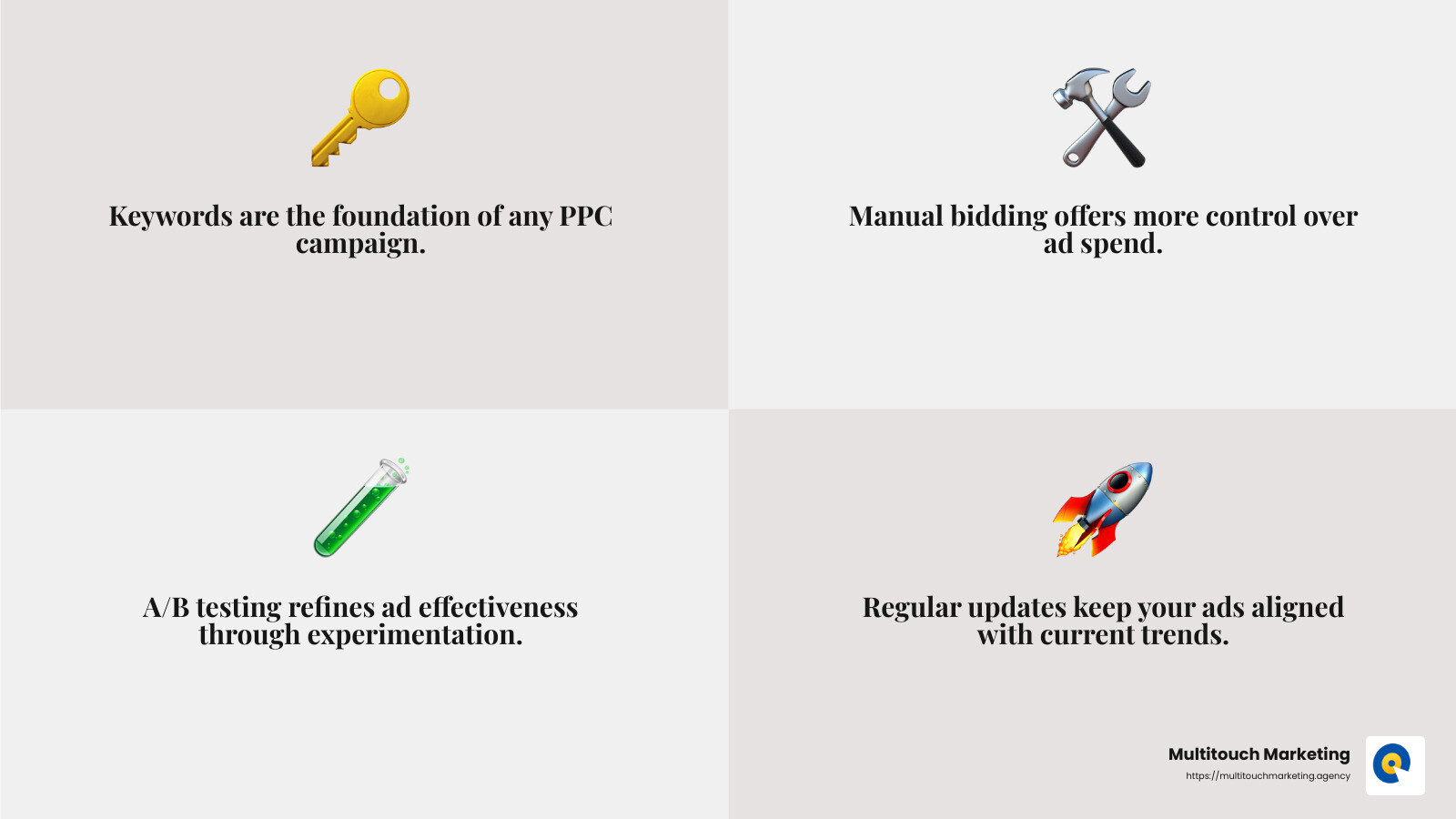PPC campaign optimization is a powerful tool for businesses looking to boost their visibility and drive targeted visits to their websites. This digital advertising strategy allows companies to place their ads right where potential customers are searching, ensuring that the right eyes are on their products or services. Here’s a quick breakdown for those in a hurry:
- PPC (Pay-Per-Click): A form of digital advertising where businesses pay a fee each time their ad is clicked.
- Campaign Optimization: Involves tweaking ads, keywords, and landing pages for the highest return on investment (ROI).
- Targeted Visits: Ensures that your site visitors are potential customers actively searching for what you offer.
Understanding the basics of PPC can transform a digital marketing strategy from average to exceptional, capturing the attention of those who matter most to your business. This article will guide you through the essentials and advanced techniques to make the most of your PPC campaigns.
I’m Milton Brown, a strategic digital marketer with experience in PPC campaign optimization. My career has spanned various industries, from e-commerce to healthcare, handling substantial marketing budgets and implementing advanced strategies for measurable success. Let’s dive deeper into how you can leverage PPC techniques for your business.
Terms related to PPC campaign optimization:
Understanding PPC Campaign Optimization
PPC campaign optimization is like fine-tuning a musical instrument. It requires attention to detail, constant adjustments, and a touch of creativity. Let’s explore three key areas that can make a significant difference: keyword updates, manual bidding, and A/B testing.
Keyword Updates
Keywords are the backbone of any PPC campaign. They connect your ads with the search queries of potential customers. Regularly updating your keywords ensures that your ads are relevant and aligned with current search trends.
- Stay Current: The digital landscape is ever-changing. Regular keyword updates help you stay ahead of trends and competitors.
- Use Tools: Leverage tools like the Google Ads Keyword Planner to find new and relevant keywords. This tool can offer insights into search volume and competition.
- Negative Keywords: Don’t forget to add negative keywords. These help prevent your ads from showing up in irrelevant searches, saving you money.
Manual Bidding
While automatic bidding saves time, manual bidding gives you more control. You can adjust bids based on performance, ensuring you get the most out of your budget.
- Control: Manual bidding allows you to prioritize high-performing keywords, increasing visibility and conversions.
- Strategy: Focus on one campaign at a time. Lower bids for keywords with high impressions but low conversions. Increase bids for top-performing keywords to boost their position.
- Transition: Start with manual bidding to gather data, then consider moving to automated strategies for long-term efficiency.
A/B Testing
A/B testing is the art of experimentation. By testing different versions of your ads, you can identify what works best and refine your approach.
- Test Elements: Experiment with headlines, descriptions, and call-to-action buttons. Even small changes can lead to big results.
- Data-Driven Decisions: Use the data from your tests to make informed decisions. This helps in optimizing your ads for better performance.
- Continuous Improvement: A/B testing is not a one-time task. Regular testing ensures your campaigns evolve with changing consumer behaviors.
Incorporating these strategies into your PPC campaign optimization process can lead to more effective campaigns and higher returns. Next, we’ll explore some top strategies to further improve your PPC efforts.
Top Strategies for PPC Campaign Optimization
When it comes to PPC campaign optimization, employing the right strategies can make all the difference. Let’s explore five essential tactics that can lift your campaigns to new heights: manual bidding, remarketing, responsive search ads, conversion tracking, and Performance Max campaigns.
Manual Bidding
Manual bidding offers a hands-on approach to managing your PPC budget. It allows you to set your own bid prices and prioritize high-performing keywords.
- Customization: Increase bids for keywords that convert well and lower bids for those that don’t. This targeted approach can improve your return on investment (ROI).
- Control: With manual bidding, you have the flexibility to adjust bids based on real-time data, giving you an edge over automated systems.
Remarketing
Remarketing is a powerful way to re-engage users who have previously interacted with your site.
- Targeted Ads: By showing ads to users who have already visited your website, you can create personalized and highly relevant ad experiences.
- Increased Conversions: Since these users are already familiar with your brand, they are more likely to convert. As Steve Dang from HawkSEM notes, video retargeting is an underused tool that combines the power of video and remarketing.
Responsive Search Ads
Responsive search ads (RSAs) adapt to show the most relevant message to users.
- Flexibility: Provide multiple headlines and descriptions, and let Google optimize the combinations for the best performance.
- Broader Reach: RSAs can serve more potential customers by dynamically adjusting to match their search queries.
Conversion Tracking
To truly understand the effectiveness of your PPC campaigns, conversion tracking is essential.
- Measure Success: Track actions like purchases, sign-ups, or downloads to see which ads drive the most valuable interactions.
- Optimize Strategies: Use this data to refine your campaigns and focus on what works best, ensuring your ad spend is directed towards achieving your business goals.
Performance Max Campaigns
Performance Max campaigns are designed to maximize conversions across Google’s vast network.
- Comprehensive Reach: These campaigns leverage machine learning to optimize bids and placements across platforms like Search, Display, YouTube, and more.
- Efficiency: By using customer signals, Performance Max campaigns identify new audiences and adjust bids to achieve your desired outcomes.
Implementing these strategies can significantly boost your PPC campaigns, ensuring they are not only effective but also efficient. Let’s explore some advanced techniques that can further improve your PPC efforts.
Advanced PPC Techniques
To truly stand out in the crowded world of pay-per-click advertising, understanding advanced techniques can give your campaigns an extra edge. Let’s explore some advanced strategies: Microsoft Ads, Amazon Ads, Core Web Vitals, and the E-E-A-T strategy.
Microsoft Ads
While Google Ads is the dominant force in PPC, Microsoft Ads offers unique advantages that shouldn’t be overlooked.
- Lower Competition: Depending on your industry, there might be less competition on Microsoft than on Google. This often means lower costs per click (CPC).
- Unique Features: Microsoft Ads provides tools like action extensions, which add call-to-action buttons directly in your ads, and LinkedIn profile targeting, allowing you to target users based on their professional profiles.
Amazon Ads
For ecommerce businesses, Amazon Ads can be a game-changer. Unlike other platforms, Amazon users are often ready to buy, which can lead to higher conversion rates.
- Ad Types: Options include brand ads, product ads, and brand videos. These formats help capture attention in different ways.
- Targeting: Amazon offers both automatic and manual targeting. Automatic targeting uses Amazon’s algorithm to select related keywords, while manual targeting allows you to choose specific keywords to bid on.
Core Web Vitals
Even the best PPC campaigns can fall short if your website isn’t optimized. Core Web Vitals are critical for ensuring a smooth user experience.
- Loading Performance: Aim for pages that load in under 2.5 seconds to keep visitors engaged.
- Visual Stability: Ensure page elements don’t shift unexpectedly, which can frustrate users.
- Interactivity: The time between a user action and the site’s response should be under 100 milliseconds.
E-E-A-T Strategy
Content quality is crucial, and Google’s E-E-A-T (Experience, Experience, Expertise, Authoritativeness, Trustworthiness) strategy is key for ranking well.
- High-Value Content: Ensure your content is original, detailed, and relevant to your audience.
- Author Expertise: Include biographies for authors, especially those with industry expertise, to establish credibility.
- Citations and Sources: Use external sources and quotes to back up your claims, enhancing the trustworthiness of your content.
By integrating these advanced techniques into your PPC strategy, you can improve your campaigns’ effectiveness and ensure they deliver the best possible results. Next, we’ll tackle some common questions about PPC campaign optimization.
Frequently Asked Questions about PPC Campaign Optimization
What is PPC campaign optimization?
PPC campaign optimization is the process of continuously improving your pay-per-click advertising strategy to achieve better results. This involves analyzing data, adjusting bids, refining keywords, and improving ad copy. The goal is to increase the return on investment (ROI) by attracting high-quality traffic that converts into customers.
Google Ads, for instance, has a Quality Score system that plays a crucial role in optimization. A higher Quality Score means your ads and landing pages are more relevant and useful to users, leading to better ad placement and lower costs per click.
How can I make my PPC more effective?
To make your PPC campaigns more effective, consider implementing the following strategies:
- Keyword Management: Use tools like Keyword Lasso to identify high-performing keywords and the Negative Keyword Finder to eliminate non-performing ones. This ensures you’re targeting the right audience and not wasting budget on irrelevant clicks.
- A/B Testing: Regularly test different ad variations to see which performs best. This includes testing headlines, descriptions, and calls-to-action.
- Optimize Landing Pages: Ensure your landing pages are aligned with your ads and provide a seamless user experience. Include product images, prices, and clear calls-to-action to encourage conversions.
- Demographic Targeting: Use Google Ads’ demographic targeting options to reach the right audience based on factors like age, gender, and location.
- Continuous Monitoring: Regularly review your campaign performance and make data-driven adjustments to improve results. This includes monitoring metrics like click-through rates (CTR) and conversion rates.
By following these best practices, you can improve the effectiveness of your PPC campaigns and achieve your marketing goals.
What is the difference between PPC and SEO?
PPC and SEO are both strategies used to drive traffic to your website, but they operate differently:
- PPC (Pay-Per-Click): This is a paid advertising model where you pay each time someone clicks on your ad. It provides immediate visibility at the top of search engine results pages (SERPs), making it ideal for quick results. However, it requires continuous investment to maintain visibility.
- SEO (Search Engine Optimization): This is an organic strategy focused on optimizing your website to rank higher in search engine results. It involves improving site content, structure, and keywords to increase visibility over time. While it doesn’t require direct payment for clicks, it does require ongoing effort and can take longer to see results.
Both PPC and SEO have their advantages and can be used together to create a comprehensive digital marketing strategy. PPC offers quick visibility, while SEO provides sustainable, long-term traffic growth.
Need help?
Navigating PPC campaign optimization can feel like a daunting task. With ever-changing algorithms and a sea of competitors, it’s easy to feel overwhelmed. But that’s where we come in. At Multitouch Marketing, we specialize in turning complex PPC strategies into clear, actionable plans.
Our team of experts in Raleigh, NC, focuses on understanding the dynamic nature of PPC marketing. We keep up with the latest trends and technologies to ensure your campaigns are always ahead of the curve. From manual bidding strategies to remarketing and responsive search ads, we tailor our approach to fit your unique business needs.
We believe that every click counts. That’s why we emphasize continuous monitoring and testing to optimize your campaigns. Our goal is to increase your ROI by attracting high-quality traffic that converts into loyal customers.
By partnering with us, you gain access to expert guidance that simplifies the complexities of PPC. We help you focus on what matters most: growing your business.
Want to learn more about how we can help with your PPC needs? Get in touch with us today and let’s optimize your campaigns for success!




